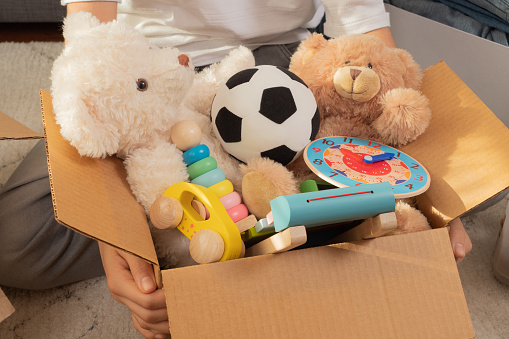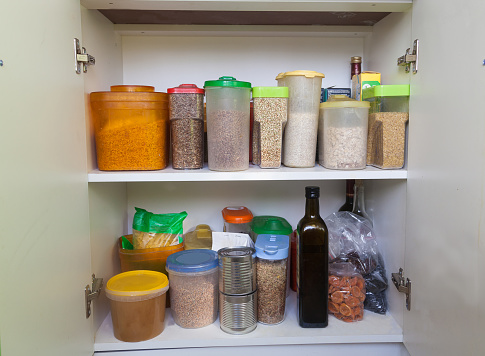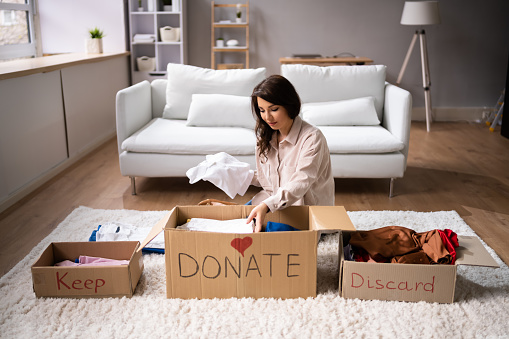How to Declutter Your Way to a Fresh Start
Published on August 23, 2023 | 8 Minute read

Melanie
Ortiz Reyes
Content Specialist
Moving to a new home is an exciting experience, but it can also be incredibly overwhelming, especially if you're not prepared. What's one of the most important tasks before moving? Yes, decluttering. Decluttering is probably one of the most dreaded steps in preparing for a move, but it lightens your load and streamlines the moving process, making it more efficient and less stressful.
One of the benefits of decluttering is that you'll have fewer items to pack up and move to your new home. This saves time and reduces moving expenses, as professional movers often charge by the weight or volume of your belongings. Decluttering before the move ensures that you only bring essential and meaningful items, making the unpacking process more efficient and allowing you to settle in quickly.
So, what should you declutter before relocating?
Unused or Unwanted Items
Start by identifying items you haven't used in a long time or no longer have a purpose. It's not just about tossing things into trash bags. It's an effort to curate your belongings, making sure that you only bring what's truly important and meaningful to your new home.
Consider the practicality and necessity of each item. Ask yourself when you last used it and whether you will use it again in your new home. Items with sentimental value or frequent utility should be moved to the "keep" pile, while things that have been collecting dust should be considered for donation, sale, or disposal. Here are some examples:
- Old clothes
- Books
- Outdated media (CDs, DVDs)
- Broken items
- Excessive decorations
- Unused craft supplies
- Newspapers and magazines
Duplicates
Begin by identifying the duplicate items in your home. These are things you have more than one of, often serving the same or similar purposes. Gather all similar items together. For example, if you're dealing with kitchenware, put all your pots, pans, and utensils in one place. This makes the decision-making process more straightforward.
Take into account the quality and condition of the items. Suppose one of the duplicates is significantly better in terms of quality or condition. In that case, it may be an easy choice to keep it and eliminate the others.
While doing this, consider the space limitations in your new home. If you're moving to a smaller space, keeping duplicates may not be feasible. Be mindful of whether the duplicates will fit and be useful in your new environment.
Keep what you need and donate or sell the rest. Here are some examples to guide you through this process:
- Extra sets of dishes, glassware, or cutlery
- Multiple pairs of shoes that serve the same purpose (like several pairs of black sneakers)
- Extra sets of bed linens or towels that you don't use frequently
- Duplicate board games or card games that you rarely play
- Extra stuffed animals or toys that have accumulated over the years

Irreparable Items
If you have broken items that are beyond repair, it's time to say goodbye. Keeping broken items will only take up valuable space in your new home. Set aside the irreparable items in a designated area, keeping them separate from items you plan to keep or donate to avoid accidentally packing them and bringing them to your new home. Also, check if any of the irreparable items can be recycled. Many electronic devices, for example, can be taken to recycling centers where they can be disposed of safely.
- Cracked glassware
- Damaged jewelry
- Tools with extensive rust
- Small appliances with missing or broken parts
- Stuffed animals that are heavily soiled
Now for the hard part, consider whether any of the irreparable items have sentimental value. Sometimes, items that are no longer functional still hold emotional significance. Take a moment to reflect on why these items are meaningful to you. Consider the memories, stories, or emotions attached to each item.
A good way to preserve the memory of these items is to take photos of them. This keeps the memory attached to them and allows you to revisit them visually whenever you wish.
Be gentle with yourself throughout this process. Decluttering sentimental items can be emotionally taxing, and it's okay to feel sadness or grief. Remember that you're choosing to create a fresh start in your new home while preserving the memories that matter most.
Outgrown Items
Divide your outgrown items into categories, such as clothing, toys, books, and furniture. This helps you tackle each category systematically. If you have children, you've likely accumulated many toys and clothing that your kids have outgrown. Donate or sell these items to make space for age-appropriate belongings.
To identify clothing that no longer fits or is no longer worn, go through your and your family members' closets and drawers. Start with your children by having them try on items to be sure they've outgrown them. For adults, try on clothes you're unsure about. While doing this, keep in mind certain clothing might not be suitable for your new home if you're moving to an area with a different climate. Here are other items you can check:
- Toys and games that are no longer age-appropriate
- Children's books that are no longer suitable for their reading level
- Outgrown furniture like cribs, high chairs, and car seats
- Home decor that doesn't fit your style and taste anymore

Expired Items
Decluttering expired items is a smart way to ensure you're packing and transporting items that are no longer usable. Begin by gathering trash bags and decide where to start. This could be your kitchen, pantry, medicine cabinet, or even your cosmetics drawer. Take the time to carefully examine each item and check for expiration dates. If you find something you no longer use but hasn't expired, consider donating it.
Don't forget to check your garage and storage areas. Be sure to check these spaces for items like old paints, motor oil, or gardening supplies. Remember:
- Expired medication and cleaning supplies should be disposed of safely. Make sure to follow your local guidelines for proper disposal methods.
- Expired cosmetics and skincare products can be harmful to your skin. Most of these products have a PAO (period-after-opening) symbol.
- Some batteries may be recyclable. Check your local guidelines for how to recycle these.
Unused or Unwanted Furniture
When you begin decluttering furniture, start with the obvious items. These are the pieces you absolutely know you no longer need or want. Maybe it's that old, worn-out coffee table that's been collecting dust or the dining chairs you've replaced but never got around to disposing of. By tackling the obvious choices first, you'll gain momentum and a sense of accomplishment.
Consider the size and layout of your new home as you make decisions about furniture. Measure the dimensions of rooms and doorways because you'll want to make sure that the furniture you plan to keep will fit comfortably in your new environment. Nobody wants to struggle trying to fit oversized furniture through doorways on moving day. Consider whether you need all your furniture and whether it's worth the cost and effort to move it. Good questions to ask yourself during this process are:
- Do you love it?
- Is it functional?
- Does it fit in your new space?
Outdated Documents
Collect all of your paperwork from filing cabinets, drawers, and storage boxes. Next, you'll want to organize your paperwork into categories. Common categories include financial documents, legal documents, and personal records. Go through each category of paperwork and ask yourself:
- Is this still relevant and necessary?
- Can I access this information online?
For documents you want to keep but don't need a physical copy of, consider scanning and saving them electronically. For sensitive documents like old bank statements, medical records, tax returns, and canceled checks, using a shredder is the way to go. This will keep your private information confidential even after you dispose of it.

There are many benefits to decluttering, the biggest ones being saving on moving costs and relieving stress. Don't forget to sell, donate, or recycle. Remember, one person's unwanted furniture can be another person's treasure. Keep your excitement levels up during this process by thinking about your fresh start at your new place. The fewer items you bring with you, the bigger canvas you'll have to start the next chapter of your life.